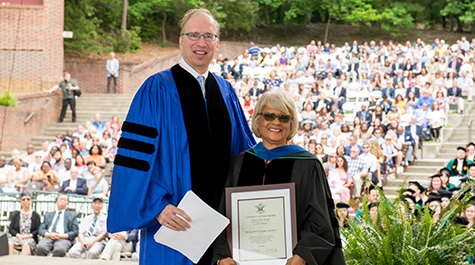Beth Hopkins J.D. ’77 Receives Law School Alumni Association’s Citizen-Lawyer Award
The William & Mary Law School Alumni Association honored Beth Hopkins J.D. ’77 with the 2018 Citizen-Lawyer Award during the Law School’s Diploma Ceremony on May 13. The award is the association’s highest recognition and is given annually to a graduate or friend of the Law School who has made “a lifetime commitment to citizenship and leadership.”
Professor Hopkins spent more than 30 years in various roles at Wake Forest University, most recently as the inaugural director of the Smith Anderson Center for Community Outreach at Wake Forest Law.
The pro bono apparatus that Professor Hopkins developed for Wake Forest students and lawyers across North Carolina was astounding,” said Davison M. Douglas, Dean and Arthur B. Hanson Professor of Law. “It brought in corporations, law firms, and government agencies to provide opportunities for students, but also lawyers, to more robustly engage pro bono opportunities; in fact, the ABA would recognize this program as a truly extraordinary development in public interest.”
Hopkins graduated with honors from Wake Forest University in 1973, one of two African-American women who lived on campus at that time. She then earned her J.D. from William & Mary in 1977.
Her first job out of law school was with the Richmond civil rights law firm of Hill, Tucker & Marsh, where she worked for the legendary civil rights attorney Oliver Hill. She then moved to the Virginia Attorney General’s Office, where she worked mainly on education issues, and then spent a number of years as an Assistant United States Attorney, first in Richmond and later in Louisiana.
In 1985, Hopkins returned to Wake Forest University, starting out in the university’s legal department, and going on to perform a number of roles, including teaching both law and history. Most significantly, she became director of the Law School’s Public Interest and Pro Bono program. Always very involved in the community, she has held leadership positions in the YWCA and the United Negro College Fund, among others.
In her remarks to students, Hopkins recounted how, at the age of six, her grandmother instilled in her the need to do outreach. She remembered gathering shoes and clothing for African-American children in an orphanage in Chesterfield County, Virginia.
This mushroomed into an awareness to serve others in need, especially when she became a lawyer. She urged the Class of 2018 to do likewise.
“Remember, our profession is an honorable one, and it is our privilege to serve those who have limited access to the justice system,” Hopkins said. “You’ll be busy, but never get too busy to reach out and touch somebody’s hand.”
Hopkins concluded by saying her generation followed the footsteps of the giants of humanity such as Justice Thurgood Marshall, Oliver Hill, Senator Herbert Lehman of New York, Marian Wright Edelman of the Children’s Defense Fund, and Justice Ruth Bader Ginsburg.
“Now it is up to you to keep the flame burning for the disenfranchised and the people who need our special services,” she said.
***
The concept of the citizen lawyer is rooted in Thomas Jefferson's original mission for the Law School that he created in 1779 at William & Mary. Jefferson and the man he recruited to establish the school, his mentor George Wythe, wanted students not only to be skilled practitioners of the law, but also leaders for the common good of their communities, states and nation.
About William & Mary Law School
Thomas Jefferson founded William & Mary Law School in 1779 to train leaders for the new nation. Now in its third century, America's oldest law school continues its historic mission of educating citizen lawyers who are prepared both to lead and to serve.
